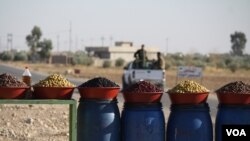The Iraqi government campaign to retake Mosul from Islamic State, or IS, militants has resulted in major damage to nearby towns and villages.
But the fighting has not stopped sales of a local food product: olives.
Issa, a 24 year old Iraqi man, points to a group of olive trees at the base of a nearby mountain.
"For two years I couldn't get to those trees," he says. "But now I water them and they will come back. Olives are strong."
Peshmerga forces controlled the mountains while IS forces held his village. Issa says the militants would not let local people get too close, for fear they might escape.
Two weeks ago, Peshmerga forces captured the town of Bashiqa after a three-day battle. Homes and some streets are still being cleared of bombs. But along the roads, people like Issa sell olives and olive oil to travelers – mostly soldiers. The olive trade appears to be the only business that has survived in the area to the north and northwest of Mosul.
When the Islamic State had control of the area, the locals sold olives to IS militants. They were the only people who had money to buy food. Even then, militants paid much less than the normal price.
Samer is an olive seller who operates a stand near the village of Khorsebad. "When IS was here, we were selling these (olives) for 500 to 600 Iraqi dinars (about 50 American cents) a kilo. Now we sell the same for 6,000 dinars (about 5 dollars)."
Historically, olive trees have been a sign of peace, civilization, and honesty. For the farmers, the trees now represent something much more important: a chance to rebuild their lives.
Today most of the buyers of olives are Peshmerga and Iraqi soldiers going to and from Mosul, about 30 minutes away by car. Most civilians are not permitted to pass through military checkpoints. The area is still considered a war zone.
"All the people in my village depend only on this business," says Issa. He supports his wife and four children by selling olives. "And the Peshmerga soldiers all know we have the best olives."
Gosum owns a shop near Bashiqa. His business was badly damaged. He says it usually takes three years for neglected olive trees to produce fruit if they regularly get water. Once a well-known fruit farmer, he now sells olives in small plastic bags to feed his 13 children.
In and around Bashiqa, the local population is also trying to recover from the physical and mental damage.
Gosum tells of the fear the villagers felt when the fighting reached his village. "It was very dangerous because we were in the middle of it," he says.
A few kilometers away, Issa climbs the stairs of a building once used by IS gunmen. Below, one farm was completely burnt. The farmer was a Peshmerga fighter who left IS territory as soon as he could.
"If you left the area," Issa says, "IS took everything."
In the building next door, the saying "Long Live the Islamic State" can still be seen on a wall.
Issa tells of the fear villagers felt during IS rule. "They would listen at our door to see if we were talking on mobile phones. If you saw an IS militant, you would be terrified."
I’m John Russell.
Heather Murdock wrote this story for VOA News. John Russell adapted this story for Learning English. George Grow was the editor.
We want to hear from you. Write to us in the Comments Section.
______________________________________________________________
Words in This Story
checkpoint – n. a place where people, cars, etc., are searched by someone (such as a police officer) before being allowed to continue
neglected – adj. not given enough attention or care
shop – n. a small business or store
mobile – adj. of or related to being moved or transported




